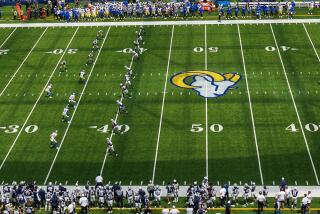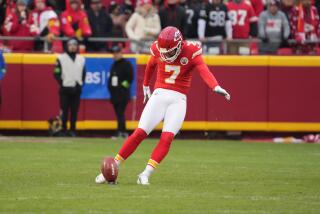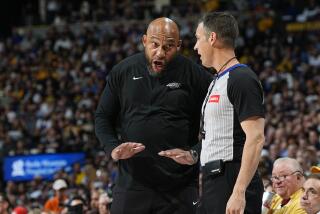It’s hard to make heads or tails of NFL’s overtime rule
The truth was hard to hear amid a Superdome din, difficult to see through French Quarter tears, impossible to reckon immediately after what felt like one of the most deserved victories in NFL history.
Two days later, though, it’s still there, pounding like a hangover, reeking like a Bourbon Street back alley.
Two days later, the truth is staring in the face of a league too shrouded in 36 years of silly tradition to see it.
That great victory by the New Orleans Saints against the Minnesota Vikings in the NFC championship game Sunday night?
It wasn’t fair.
It was fun, it was exciting, it felt right, but it wasn’t fair.
The Saints won during an overtime period in which the Vikings never touched the ball.
The Saints won by taking advantage of the worst rule in American sports.
Only in the NFL can a game be decided by an extension of play in which both teams might not have an equal chance to score.
Only in the NFL can a game be contested for three hours by two full teams, then be decided in 10 minutes by only half of each team.
The NFL calls it sudden death, but that’s true only for the loser of the coin toss. For the winner of that toss, it’s instant life. In a league that otherwise takes great pains to promote fairness both on and off the field, it’s an unnecessary evil.
Not to dull the justified buzz of the Saints’ 31-28 victory, but, well, you saw it.
The Vikings, you’ll recall, lost the overtime coin toss, kicked to the Saints, absorbed a 40-yard kickoff return by Pierre Thomas, then watched the Saints drive all of 39 yards before Garrett Hartley won it with a 40-yard field goal.
Game over after 39 yards.
Game over with future Hall of Fame quarterback Brett Favre watching from the sideline, just as fellow star Peyton Manning watched his season end last year in a first-possession overtime loss in San Diego.
In a game of offense and defense, why does the overtime period not involve both teams’ offense and defense?
Baseball’s extra-innings rule allows both teams’ offense and defense to compete. Basketball’s overtime rule is simply an extension of the regular game. Hockey’s shootout rule also involves players who score and one who is charged with stopping them. Even college football, with its quirky dueling possessions rule, does it better.
Certainly, while watching the Saints drive toward victory, it was easy to say, “Well, Favre ended the game by throwing the interception, he deserves to watch.”
But he was watching only because his team called “heads” and the coin showed “tails.” He was never given a final chance to win this dramatic, drawn-out game of skill because his team lost a five-second game of chance.
“I actually think you should give the other team a possession,” Dan Marino, Hall of Fame quarterback, said Tuesday on a CBS conference call. “Especially [with] Brett Favre. He threw an interception. Give that guy a chance, one chance. Give him at least one possession in overtime.”
I agree. But this view is certainly not unanimous. I asked the question on the Super Bowl preview conference call, and immediately the network’s three pregame experts began debating it. Marino wants the rule changed. Shannon Sharpe does not. Boomer Esiason seemed uncertain.
Sharpe took the popular view that if an NFL defense can’t stop its opponent on the first overtime possession, then that team doesn’t deserve to win.
“Fairness doesn’t happen in professional sports . . . These are grown men. . . . I need [Vikings end] Jared Allen, the third-highest-paid defensive player in the league, to step up for me and make a play,” Sharpe said.
Esiason took the view that even by giving each team one possession, it might not be fair.
“How about if the New Orleans Saints kick a field goal in overtime, and then they give the ball back to the Minnesota Vikings and they score a touchdown?” he said. “Now what are we going to do?”
It’s one thing to have respected former NFL stars and commentators arguing about player performance or coaching decisions. But here, two weeks before the Super Bowl, and they’re arguing about a rule?
That should tell the NFL owners all they need to know about that rule.
It is often difficult to get 24 of 32 owners to agree on anything, but shouldn’t changing this rule be the easiest decision since allowing shoulder pads?
Those owners often point to the statistics that the winner of the coin toss is only slightly more likely to win the game. According to the Elias Sports Bureau, since the rule’s inception in 1974, the winner of the coin toss has won 239 times in 445 games, a 54% rate.
However, around 70% of those victories came by field goals, which means not only can overtime be played without one team’s offense, but it can be played with only a fraction of the other team’s offense.
It’s a real football game decided by something other than real football. For this country’s new national pastime, that’s not very American.
The solution here is easy, requires all of five words.
Give both teams the ball.
If a team that wins the coin toss scores, then that team kicks off to the other team for its one shot. If the team that wins the toss is stopped, the other team simply takes over and they play until someone scores.
Think the Saints would have played for only a field goal if they knew Favre would get the ball back? Think Drew Brees would have been the winning quarterback by throwing for just 21 yards on the final drive?
But Hartley’s kick was perfect, and the moment was sublime, and pen-on-their-sleeves writers like me described the scene as if the Saints had just delivered a sermon, and afterward nobody dared speak a blasphemous word.
But the truth remains, and if you think it’s no big deal, then ponder something like this happening in two weeks. Actually, I hope it does happen again in two weeks.
“They’re not going to change the rules until it happens in the Super Bowl,” said Marino.
He’s right. Only when the worst rule in American sports is exposed on American sports’ biggest stage will it finally die. Can you imagine?
Saints: “We really want this Super Bowl championship.”
Colts: “Fine, we’ll flip you for it.”
twitter.com/billplaschke
More to Read
Go beyond the scoreboard
Get the latest on L.A.'s teams in the daily Sports Report newsletter.
You may occasionally receive promotional content from the Los Angeles Times.











